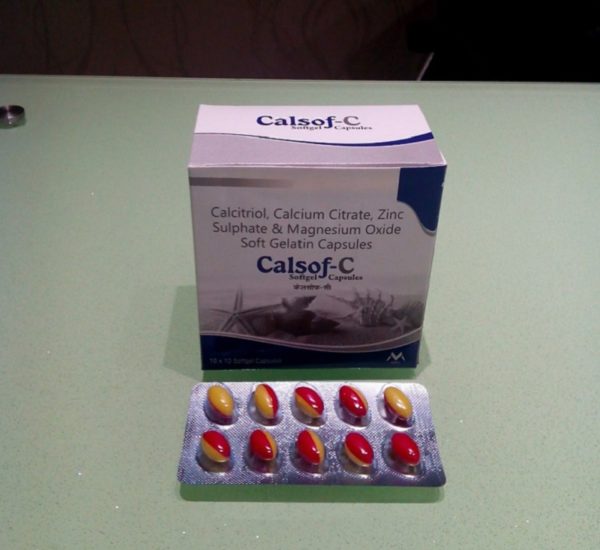CALSOF-C
COMPOSITION: CALCIUM CITRATE 500 MG CALCITRIOL 0.25 MCG ZINC MONOHYDRATE 7.5 MG
- Reviews (0)
- Indications
- Description
Be the first to review “CALSOF-C”
Effective in increasing skeletal mass
● Useful in osteoporosis
● Treatment and prevention of hypocalcemia
● Essential for bone formation, nervous, muscular, and skeletal systems
● Treatment of hyperphosphatemia
Calcium plays a vital role in the anatomy, physiology and biochemistry of organisms and of the cell, particularly in signal transduction pathways. The skeleton acts as a major mineral storage site for the element. Bone serves as an important storage point for calcium, as it contains 99% of the total body calcium. This combination is useful in people having low blood calcium levels; who do not get enough calcium from their diets. Calcium is the fifth most abundant element in the human body. It plays an important role in many physiological processes, including nerve and muscle functions. Not surprisingly, nutritional and metabolic deficiencies of calcium can have broad-ranging adverse effects. Since about 90% of the body's calcium is found in bone tissues, many of these adverse effects are manifested through deficiencies in the structure, function and integrity of the skeletal system. Thus this combination helps in maintance of calcium & healthy skeletal system.
Calcitriol:
Calcitriol is a form of vitamin D that is used to treat and prevent low levels of calcium in the blood of patients whose kidneys or parathyroid glands (glands in the neck that release natural substances to control the amount of calcium in the blood) are not working normally. Low blood levels of calcium may cause bone disease. Calcitriol is in a class of vitamins. It works by helping the body to use more of the calcium found in foods or supplements.
Calcitriol is also sometimes used to treat rickets (softening and weakening of bones in children caused by lack of vitamin D), osteomalacia (softening and weakening of bones in adults caused by lack of vitamin D), and familial hypophosphatemia (rickets or osteomalacia caused by decreased ability to break down vitamin D in the body). It is also sometimes used to increase the amount of calcium in the blood of premature (born early) babies.
Calcium Citrate:
Calcium citrate is calcium salt of citric acid. Calcium (Ca2 ) plays a pivotal role in the physiology and biochemistry of organisms and the cell. It plays an important role in signal transduction pathways, where it acts as a second messenger, in neurotransmitter release from neurons, contraction of all muscle cell types, and fertilization. Many enzymes require calcium ions as a cofactor, those of the blood-clotting cascade being notable examples. Extracellular calcium is also important for maintaining the potential difference across excitable cell membranes, as well as proper bone formation. It has been demonstrated that calcium from calcium citrate-malate (CCM), a mixture of calcium, citric acid and malic acid, is better-absorbed than calcium from calcium carbonate (CaCO3). Calcium is used to produce the minerals contained in bones, shells and teeth through a process called biomineralisation.
Pharmacokinetics:
Calcitriol:
Absorption: Protein binding: 99.9%
Metabolism: Renal
Biological half-life: 5–8 hours (adults), 27 hours (children)
Excretion: Faeces (50%), urine (16%)
Calcium Citrate:
Approx 33% of oral calcium absorbed via active transport and passive diffusive in small intestine. Unabsorbed calcium mainly excreted via faeces. Excess absorbed calcium excreted via urine.






Reviews
There are no reviews yet.